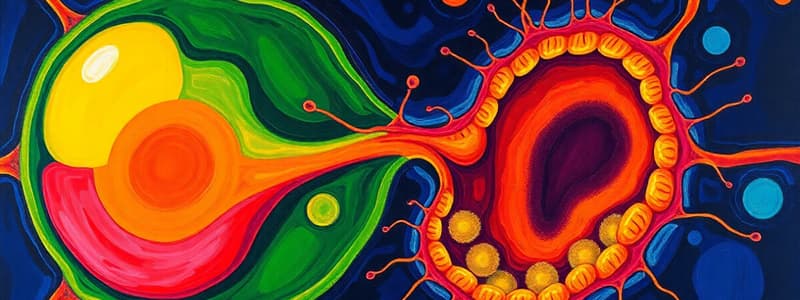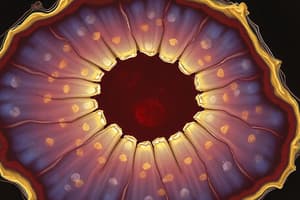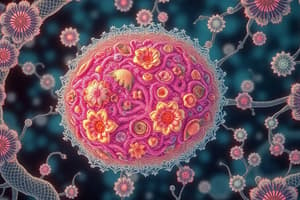Podcast
Questions and Answers
What is a characteristic that distinguishes prokaryotic cells from eukaryotic cells?
What is a characteristic that distinguishes prokaryotic cells from eukaryotic cells?
- Prokaryotic cells possess a nucleus.
- Prokaryotic cells are usually larger than eukaryotic cells.
- Prokaryotic cells have membrane-bound organelles.
- Prokaryotic cells have DNA that is not enclosed in a membrane. (correct)
How do prokaryotic cells generally differ in size when compared to eukaryotic cells?
How do prokaryotic cells generally differ in size when compared to eukaryotic cells?
- Both are approximately the same size.
- Prokaryotic cells are generally smaller. (correct)
- Prokaryotic cells are usually larger.
- Eukaryotic cells are generally smaller.
Which component is present in both prokaryotic and eukaryotic cells?
Which component is present in both prokaryotic and eukaryotic cells?
- Nucleus
- Membrane-bound organelles
- Capsule
- Ribosomes (correct)
What is true about the structural complexity of prokaryotic cells?
What is true about the structural complexity of prokaryotic cells?
What feature do some prokaryotes have that aids in movement?
What feature do some prokaryotes have that aids in movement?
What distinguishes plant cells from animal cells?
What distinguishes plant cells from animal cells?
Which of the following statements about eukaryotic cells is accurate?
Which of the following statements about eukaryotic cells is accurate?
What is a common characteristic of both eukaryotic and prokaryotic cells?
What is a common characteristic of both eukaryotic and prokaryotic cells?
What primary function do lysosomes serve in the cell?
What primary function do lysosomes serve in the cell?
Ribosomes play a crucial role in the cell by performing which of the following functions?
Ribosomes play a crucial role in the cell by performing which of the following functions?
Which component of a cell acts as the control center for genetic information?
Which component of a cell acts as the control center for genetic information?
What are the components necessary for ribosome formation found in the nucleolus?
What are the components necessary for ribosome formation found in the nucleolus?
What is the primary composition of chromatin within the nucleus?
What is the primary composition of chromatin within the nucleus?
Which structure is NOT produced by the rough endoplasmic reticulum?
Which structure is NOT produced by the rough endoplasmic reticulum?
What biological function is associated with cilia?
What biological function is associated with cilia?
What distinguishes prokaryotic cells from eukaryotic cells?
What distinguishes prokaryotic cells from eukaryotic cells?
What is the primary significance of Anton Van Leeuwenhoek's observations in 1674?
What is the primary significance of Anton Van Leeuwenhoek's observations in 1674?
What term did Anton Van Leeuwenhoek use for the tiny living organisms he discovered?
What term did Anton Van Leeuwenhoek use for the tiny living organisms he discovered?
What conclusion did Matthias Schleiden reach about plants in 1838?
What conclusion did Matthias Schleiden reach about plants in 1838?
What is a major component of most cell membranes?
What is a major component of most cell membranes?
Which function does the cell membrane perform?
Which function does the cell membrane perform?
What did Leeuwenhoek discover in 1683?
What did Leeuwenhoek discover in 1683?
What is the role of vacuoles in cells?
What is the role of vacuoles in cells?
What is one of the functions of proteins in cell membranes?
What is one of the functions of proteins in cell membranes?
What is one of the primary functions of the cytoskeleton in a cell?
What is one of the primary functions of the cytoskeleton in a cell?
Which of the following correctly describes peroxisomes?
Which of the following correctly describes peroxisomes?
What is a characteristic that distinguishes eukaryotic cells from prokaryotic cells?
What is a characteristic that distinguishes eukaryotic cells from prokaryotic cells?
Which of the following statements about prokaryotic cells is true?
Which of the following statements about prokaryotic cells is true?
Which organism classification is included in eukaryotes?
Which organism classification is included in eukaryotes?
How do the cytoskeleton's functions extend to unicellular organisms?
How do the cytoskeleton's functions extend to unicellular organisms?
Which of the following characteristics is not typical of prokaryotic cells?
Which of the following characteristics is not typical of prokaryotic cells?
What role does a centrosome play in a cell?
What role does a centrosome play in a cell?
What best describes the size comparison between prokaryotic and eukaryotic cells?
What best describes the size comparison between prokaryotic and eukaryotic cells?
Which statement about organelles in eukaryotic cells is correct?
Which statement about organelles in eukaryotic cells is correct?
What is a primary characteristic of fibrous connective tissue?
What is a primary characteristic of fibrous connective tissue?
What does the extracellular matrix of connective tissues mainly consist of?
What does the extracellular matrix of connective tissues mainly consist of?
Which type of connective tissue provides structural support and cushioning properties through a firm matrix?
Which type of connective tissue provides structural support and cushioning properties through a firm matrix?
Which connective tissue forms the skeletal system and provides protection?
Which connective tissue forms the skeletal system and provides protection?
What characteristic differentiates blood from other connective tissues?
What characteristic differentiates blood from other connective tissues?
Which statement about muscle tissues is correct?
Which statement about muscle tissues is correct?
What distinguishes the ground substance in connective tissues?
What distinguishes the ground substance in connective tissues?
Where can cartilage typically be found in the body?
Where can cartilage typically be found in the body?
Flashcards are hidden until you start studying
Study Notes
Anton Van Leeuwenhoek
- In 1674, observed tiny living organisms in pond water using simple microscopes.
- Dutch businessman and early microscopist known for magnifying small objects with a single powerful lens.
- Discovered motility in living organisms on October 9, 1676, concluding that these were living due to their motion.
- In 1683, identified bacteria and named single-celled organisms "animalcules," including protozoa.
Contributions to Cell Theory
- Matthias Schleiden (1838), German botanist, asserted all plants are made of cells after studying plant structures.
- Emphasized the cell nucleus's importance related to cell division.
Cell Structure and Function
- Cell Membrane: Double-layered lipid bilayer that controls passage of substances; contains proteins and carbohydrates.
- Lysosomes: Produced by the rough ER and Golgi apparatus; digest cell food and waste.
- Vacuoles: Sac-like structures for storage of substances.
- Ribosomes: Sites for protein synthesis following instructions from the nucleus.
- Nucleus: Cell's genetic control center and hereditary blueprint; houses DNA and directs protein synthesis.
- Nucleolus: Composed of chromatin, RNA, and proteins; synthesizes ribosome components.
- Chromatin: Granular material made of DNA and proteins.
- Cytoskeleton: Network of protein filaments maintaining cell shape and facilitating movement and organization of organelles.
- Peroxisomes: Break down fatty acids and amino acids; detoxify poisons.
- Centrosomes: Organizing centers of microtubules involved in cell division.
Prokaryotes vs. Eukaryotes
- Prokaryotes: Unicellular, smaller and simpler cells without a nucleus; DNA is not membrane-bound.
- Eukaryotes: Can be unicellular or multicellular, larger and more complex, with membrane-bound organelles and nucleus.
Comparison of Prokaryotic and Eukaryotic Cells
- Prokaryotes have no nucleus; eukaryotes contain a nucleus.
- Prokaryotes lack membrane-bound organelles; eukaryotes have them.
- Prokaryotic cells are typically unicellular, whereas eukaryotes can be both unicellular and multicellular.
Comparison of Animal and Plant Cells
- Animal Cells: Generally smaller, irregular shape; lack a cell wall.
- Plant Cells: Usually larger, rectangular, and enclosed by a rigid cell wall.
Connective Tissues
- Vary widely in form and function; characterized by an extracellular matrix composed of protein fibers and ground substance.
- Fibrous Connective Tissue: Comprises collagen fibers; found in tendons and ligaments, providing strength.
- Cartilage: Firm matrix with abundant collagen; offers structural support and cushioning.
- Bone: Forms the skeletal system; provides support, protection, and mineral storage.
- Blood: Composed of plasma, water, salts, and proteins; includes white blood cells, red blood cells, and platelets.
Muscle Tissues
- Composed of long muscle fibers allowing voluntary or involuntary body movements.
Studying That Suits You
Use AI to generate personalized quizzes and flashcards to suit your learning preferences.




